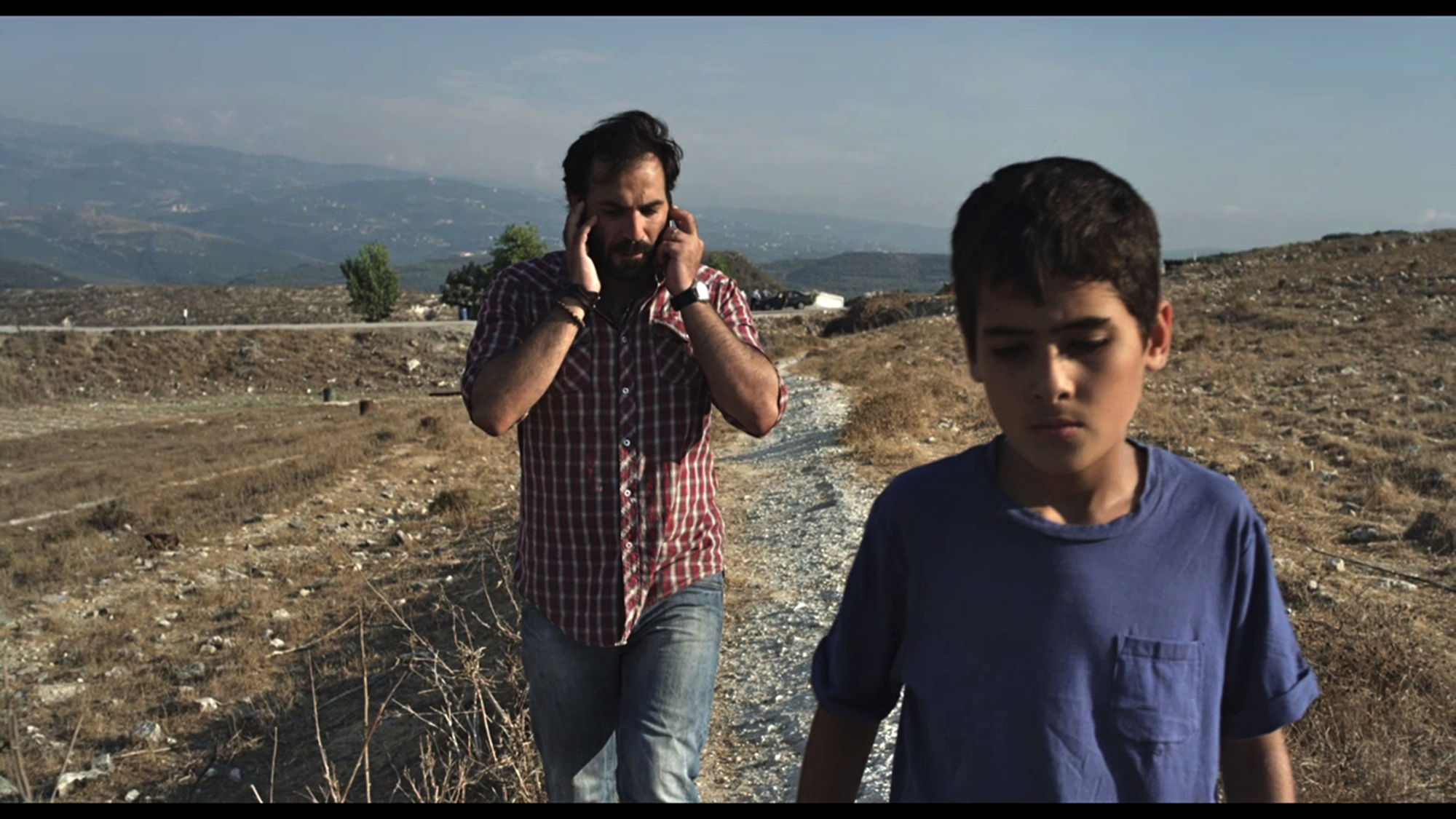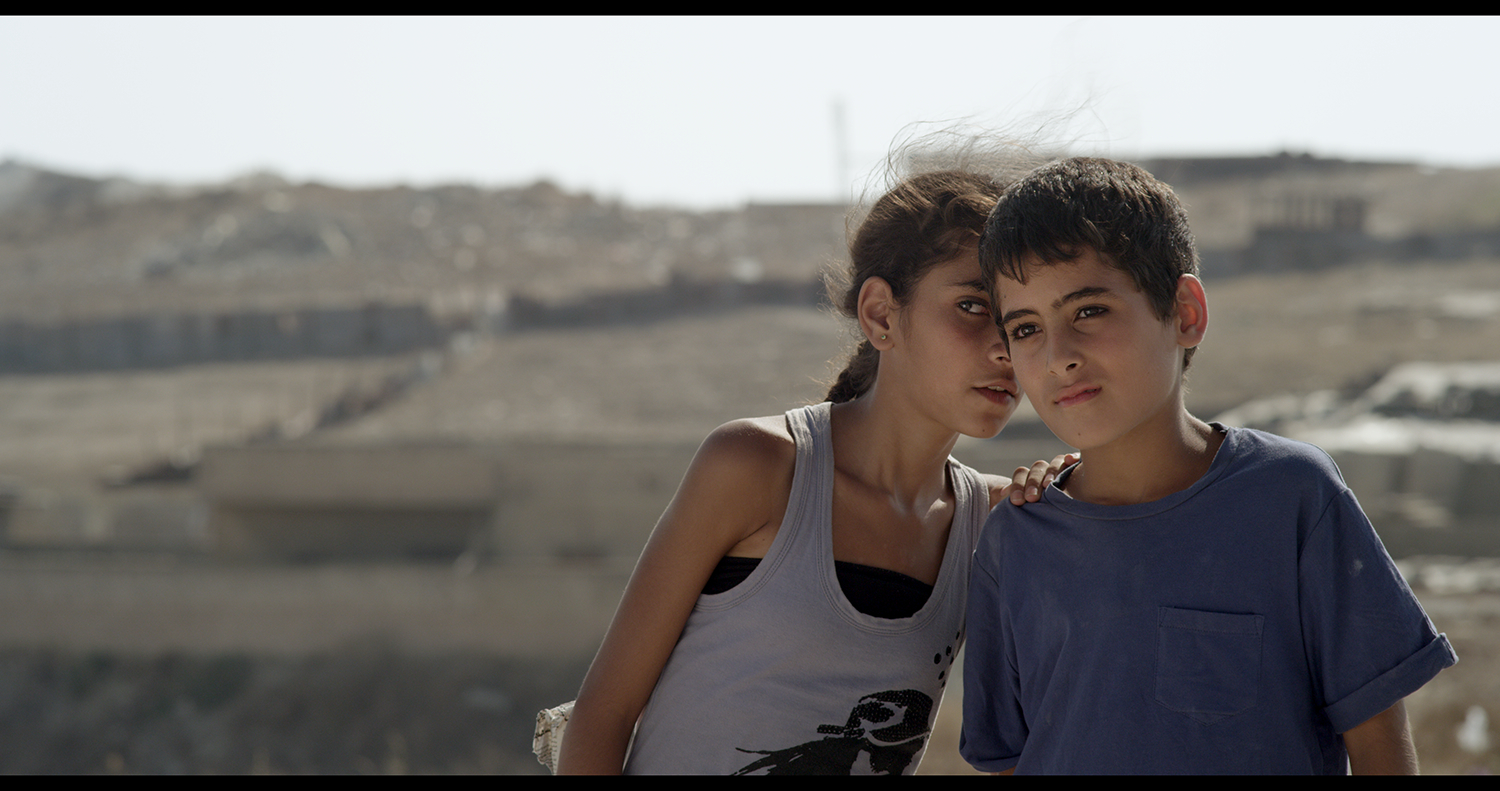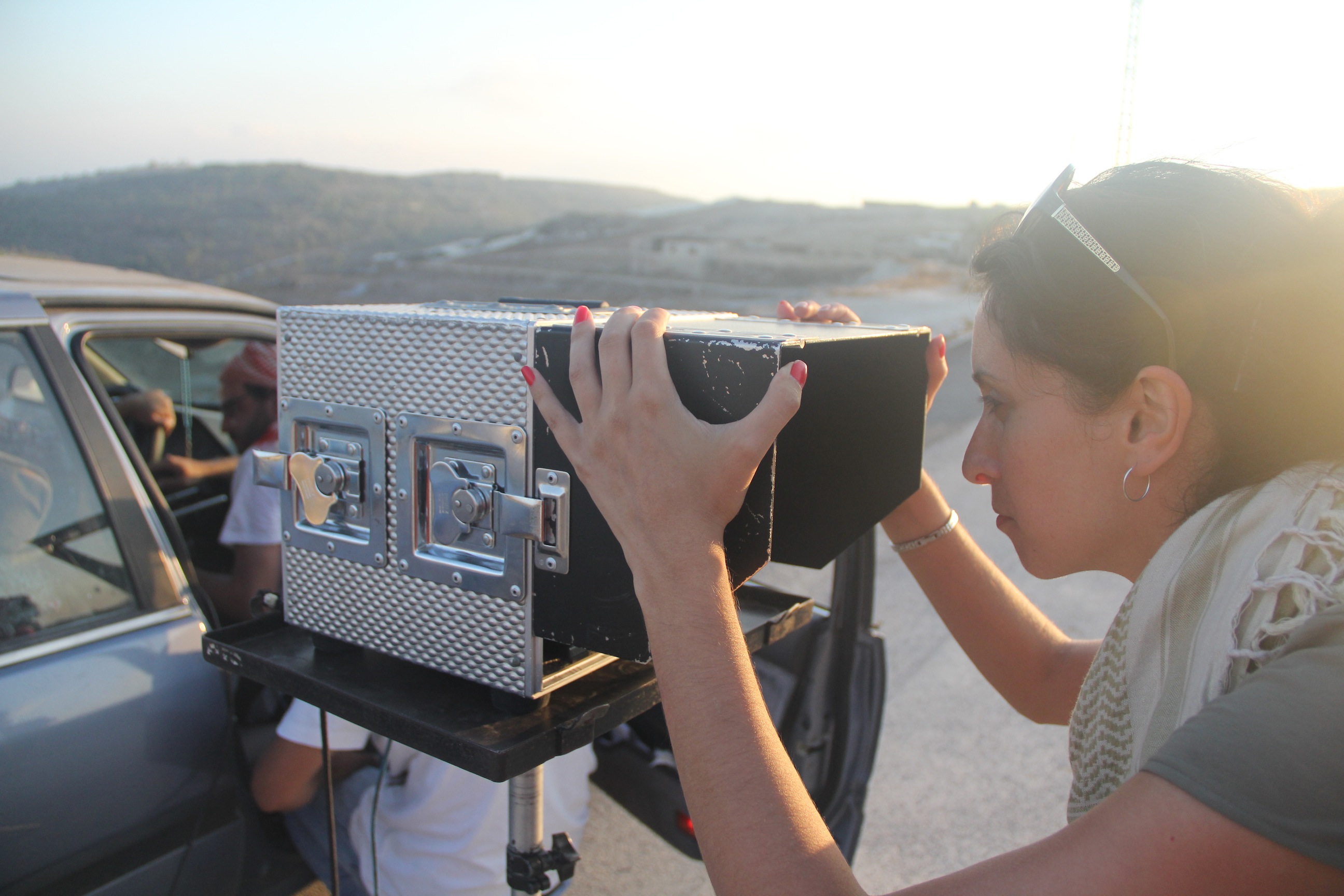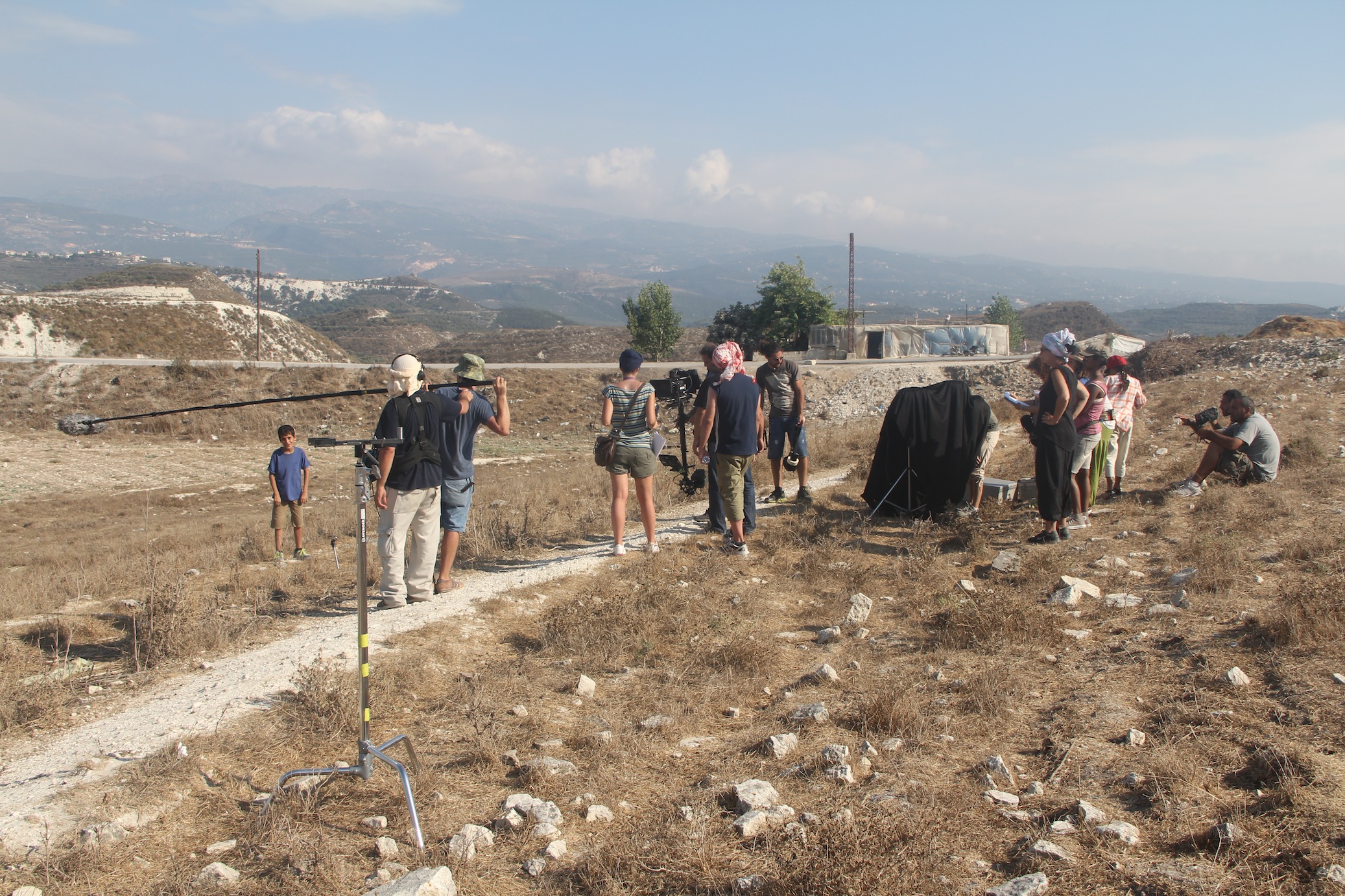Between Places: An interview with filmmaker Anna Fahr
Author ········· Shoag Al-Adsani
Published ······ Online, Nov 2014
Section ······· Culture
Published ······ Online, Nov 2014
Section ······· Culture

All images courtesy of Sepasi films
Director Anna Fahr’s latest short film, Transit Game, is about an encounter between two generations of refugees who meet at a crossroads in the mountains of Lebanon. The work is perceptive, shying away from making any political statements, and yet remains a compelling portrayal of the plight of many Syrian and Palestinian refugees who come to Lebanon.
Fahr, an Iranian-American-Canadian, is currently based in Beirut. Having received an MA in Film & Middle Eastern Studies at New York University, she remarks that “the Middle East has been a central focus of my academic and creative work for quite a while.” With influences ranging from De Sica and other Italian Neo-Realists to Rakhshan Bani-Etemad (who she wrote her thesis on) and other Iranian filmmakers of the Iranian New Wave, Anna admits that in her work she is a “realist through-and-through.”
On Iranian cinema, Anna states: “Iran has long been isolated from the region and from the global community… it’s really cinema that has managed to give voice to the Iranian people, throughout years of sanctions and isolation.” With roots in the Iranian film tradition and a focus on the Middle East, she claims that “it’s nice to work in both areas.” I spoke with Anna briefly about what it's like to work in both Arab and Iranian cinema, and her experiences making Transit Game.

SA | I thought I would start with asking about the title of the film, which to me evokes the idea of liminality, of an unsettled system – could you elaborate on the title?
AF | The idea of being in transit is a central theme in the film, which is represented through both the Palestinian kids (Saad [played by Sajed Amer] and Nada [played by Sanaa Amer]) and the Syrian refugee (Mohammad [played by Jalal Altawil]). The game on the other hand can be interpreted in different ways: on the one hand, there's the game that Saad and Nada play to pass the time while peddling newspapers, and on the other there is the larger geopolitical game being played by countries/governments that support various wars and conflicts in the region and that as a result perpetuate the cycle of exile that is experienced by refugees who must flee these conflicts.
SA | So games are structures and the characters of your film play various roles within that structure...
AF | Yes!
SA | I’m really interested in how you represented that feeling of transition, specifically regarding the film’s backdrop - as in you could’ve looked at the refugee crisis in Lebanon by going into an actual camp/refugee sector, but instead, your film is set in the mountains, and the kids are in a crossroads of sorts which adds to the idea of transition, of making choices, and also of ambiguous space. What were your personal reasons for choosing such a space?
AF | I’m glad you asked [about this]! The location was a very important aspect of the film, which actually changed in various phases of the writing process. Originally, I had imagined the film to be set closer to the Mediterranean coast, and then I thought about changing it to the city, where you would normally see street kids peddling for money. I finally settled on a remote road in a location that would resemble Lebanon’s Bekaa Valley. I love the landscape in this part of the country – for me being in a valley nestled between the mountains symbolises the idea of being between places.

SA | It’s a really beautiful area!
AF | Many refugees actually end up in that area.
SA | It’s so spacious and still.
AF | The road that we shot on had a fork in it, and an actual informal settlement where refugees were living. [So] the fork served as the perfect metaphor to situate the two kids and the settlement added an element of realism, which we see at the end when Mohammad drives past it as he’s listening to the car radio. The location itself wasn’t in the Bekaa Valley but closer to Amioun in northern Lebanon. It was a bit of a logistical nightmare to film on that road, but I got so attached to it I decided that we couldn't film anywhere else, and instead condensed the entire shoot into three days just to be able to use that location!
SA | That’s a short amount of time!
AF | Yes and we were chasing daylight since the entire film takes place during the day and [on top of that] we had child actors which meant we needed to make sure there were ample breaks, etc.

SA | Of course! Those kids were so good as well.
AF | They were wonderful!
SA | This actually leads me into my next question! I know that using childrens’ narratives is something very typical of post-revolutionary Iranian film and it’s something that I’ve always found fascinating. Using a child’s point of view seems almost exclusive to Iranian cinema as it’s rare that I see it in other films. I was wondering what your reasons were behind on adapting that point of view in an Arab setting? Although I realise that with Transit Game the perspective does shift towards the end.
AF | This was also a very deliberate choice. I'm a big fan of Iranian cinema, I am very much inspired by the aesthetics of Iranian New Wave, [and] I'm Iranian! I also shot a feature documentary in Iran [back] in 2004. [There are] many Iranian filmmakers [who] manage to tell very powerful stories by using allegory and metaphor. Censorship is an issue that Iranian filmmakers face and some have opted to tell stories through the eyes of children in order to present a social critique while abiding by the censorship codes that the government imposes. At the same time these films are very humanistic and somehow universal, and that's what I found interesting about the approach.
 SA
| It’s also interesting when you consider where a child’s perspective
would be coming from, what priorities they might have, how their value
system and even their comprehension of reality differentiate from that
of an adult...
SA
| It’s also interesting when you consider where a child’s perspective
would be coming from, what priorities they might have, how their value
system and even their comprehension of reality differentiate from that
of an adult...AF | Definitely.
SA | In your film it’s as if Saad and Nada are the ones leading Mohammed and the ones who are educating him.
AF | Yes, they represent the first wave of refugees that came to Lebanon [after 1948], even though they are the descendants of those refugees, they are still part of that generation. Mohammad on the other hand represents the new generation of refugees coming from Syria. So in some way Saad and Nada represent Mohammad’s future as a refugee in Lebanon.
SA | It’s crazy to think of Lebanon’s role as a refugee home for so many displaced peoples of the Arab world.
AF | It’s really incredible – the sheer number of people that have come here over the last few years. It’s roughly a 50 per cent increase in the country’s population, which is causing an enormous strain on Lebanon.
SA | Which is something you highlighted in the film. Depicting refugees in and of Arab countries is always problematic – how did you approach the topic? I know there’s a history of representing Afghan refugees in Iranian cinema – perhaps that I was a sort of tie in?
AF | For me, I wanted to show them as regular people. Saad and Nada are two average kids who like to have fun and play games like all kids do. They happen to be refugees. Mohammad is a father and a husband. It was important for me to present the characters as real people that were relatable to anyone, which is always a bit of a challenge.

SA | That definitely came across, I appreciated that about the film. What are your thoughts on film as a medium for displaced peoples to get their messages across?
AF | I see film as a medium that has the power to transgress cultural and political divides. It has a way of reaching people on an emotional level that regular news reports and media coverage of the refugee crisis (or other humanitarian issues for that matter) don’t always do. As a filmmaker who has lived both in the Middle East and in North America, I feel I have the unique opportunity to tell stories to audiences of both regions and to communicate ideas in a way that can reach people emotionally. That’s one of the driving forces behind my work as a filmmaker.
SA | Agreed, and that’s very much appreciated!
AF | Thank you!
sepasifilms.com
Transit Game will screen on Sunday 30 November at 20.30 as part of the 2014 London Palestine Film Festival Shorts Programme. For more details, visit: palestinefilmfoundation.org
Shoag Al-Adsani recently graduated with a degree in English literature and is looking to master in development studies next year.
